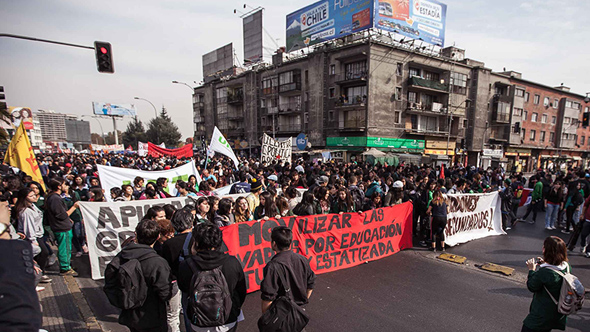
Chileans have lived, since the end of Augusto Pinochet’s dictatorship in 1990, in a neoliberal democracy with essentially two sides to its dominant governance. On the one hand, Chile has recovered its democratic tradition with a multi-party system and regular elections, but on the other hand it has followed a neoliberal dogma based on natural resource exploitation and the dismantling of the welfare state. None of the resources privatised by Pinochet have ever been returned to state ownership and, conversely to what was supposed, the Christian and social democrat coalition that ruled the country from 1990 until 2010 continued shrinking the state, taking the privatisation of education, health, pensions, telecommunications, electricity and other basic elements, such as water, to another level.
To depict this paradox, Chilean sociologist Tomas Moulian used the image of a birdcage. He suggested that democracy may be allowed to exist, but only within a certain range of action sanctioned by the multiple forces of Pinochet, military power, right wing parties who supported the dictatorship and the Christian and Social Democrat administrations who succeeded him in power in the 1988 national referendum and subsequent presidential elections. To ensure this, Pinochet stayed at the head of the army until 1998 while the Chilean constitution – enacted in 1980 by the hand of the dictatorship – remains almost unaltered today.
Neoliberal tendencies have meant that the egalitarian notion of a citizenship of rights and duties has become instead a non-egalitarian citizenship of bills and debt, where the wealthy receive better access to services whilst the rest face impoverishment.
This peculiar country and its promise of an escape from poverty through a life of hard work, has vanished through the years, taking with it all hope that Christian and Social Democrat parties can promote change. This was the situation citizens faced in 2011, when students took to the streets across the whole nation to claim their rights. These events occurred during the second year of the first right-wing administration for more than 20 years, marking the largest mobilisation since the dying days of the Pinochet regime.
Students’ mobilisation was motivated by multiple factors, chief among them an increase in student fees (Chilean universities are among the most expensive in the world when measured against per capita income). As undergraduate degrees in Chile are structured on a 5-year basis, covering this escalating cost was becoming an insurmountable task. The awkward response from Chilean authorities in 2006 was to award bank loans – with the state serving as the guarantor of the debt – on an interest rate of 5.6% per year. Within this new system, banks became the exclusive loan providers for individuals whose only chance for an education now relied on the contracting of debt for many years to come.
As the students began to mobilise in response, their aim soon switched from milder requests for increased financial support to target the whole system, with calls made for an end to profit-driven education, at any level, and the return of public and free education with quality standards for every single person, no matter their socio-economic condition. With these demands, the student movement soon became a general social movement, raising its voice outside institutional channels in street rallies, cultural acts, the occupation of buildings, assemblies, open classes, flashmobs, street dance and performance. These activities helped to fill every space in daily life with conversations about the future of the country, the levels of inequality and the strength and attention citizens would need to best respond to any reactionary state response.
At the end of 2011, the state response included the resignation of three ministers of education, as more than 600 schools and all state universities had been occupied, while more than 20 rallies saw over a hundred thousand people in the streets. In Santiago, one million people congregated in O’Higgins Park, expressing their will for change. In the immediate aftermath of these events, however, it must be observed that nothing substantial was secured. Today, Michelle Bachelet has returned to lead the country, supported by a ‘usual suspect’ coalition of Christian and Social Democrats, in a coalition that for the first time since 1990 includes the Chilean Communist Party.
The current situation is a story unfinished, especially in light of the fact that some leaders of 2011 and 2012 – as well as other non-traditional politicians – secured seats in parliament. In what may appear to be smaller victories, laws have been applied to prevent educational institutions partly funded by the state from engaging in profit-making activity, amongst other measures.
As the story continues to be told, we cannot celebrate just yet. But what one may observe with a greater degree of certainty is that the neoliberal-democratic notions of good/bad, possible/impossible, reasonable/absurd were contested and broken from below during the mobilisations, beating political and media mainstream powers. It was due to the effort and solidarity of subaltern subjects that the “natural” order of things experienced a rupture.
By Jorge Saavedra Utman | @saavedrautman









